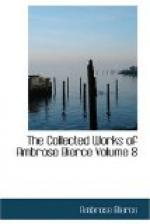when
youth and pleasure meet
To chase the glowing hours
with flying feet.
What, therefore, whence, and likewise why, is dancing? From what flower of nature, fertilized by what pollen of circumstance or necessity, is it the fruit? Let us go to the root of the matter.
II
THE BEATING OF THE BLOOD
Nature takes a childish delight in tireless repetition. The days repeat themselves, the tides ebb and flow, the tree sways forth and back. This world is intent upon recurrences. Not the pendulum of a clock is more persistent of iteration than are all existing things; periodicity is the ultimate law and largest explanation of the universe—to do it over again the one insatiable ambition of all that is. Everything vibrates; through vibration alone do the senses discern it. We are not provided with means of cognizance of what is absolutely at rest; impressions come in waves. Recurrence, recurrence, and again recurrence—that is the sole phenomenon. With what fealty we submit us to the law which compels the rhythm and regularity to our movement—that makes us divide up passing time into brief equal intervals, marking them off by some method of physical notation, so that our senses may apprehend them! In all we do we unconsciously mark time like a clock, the leader of an orchestra with his baton only more perfectly than the smith with his hammer, or the woman with her needle, because his hand is better assisted by his ear, less embarrassed with impedimenta. The pedestrian impelling his legs and the idler twiddling his thumbs are endeavoring, each in his unconscious way, to beat time to some inaudible music; and the graceless lout, sitting cross-legged in a horse-car, manages the affair with his toe.
The more intently we labor, the more intensely do we become absorbed in labor’s dumb song, until with body and mind engaged in the ecstacy of repetition, we resent an interruption of our work as we do a false note in music, and are mightily enamored of ourselves afterward for the power of application which was simply inability to desist. In this rhythm of toil is to be found the charm of industry. Toil has in itself no spell to conjure with, but its recurrences of molecular action, cerebral and muscular, are as delightful as rhyme.




